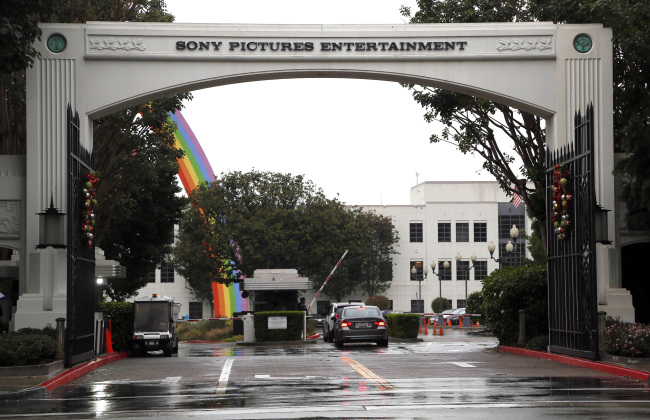LOS ANGELES (AFP) ― A group which claims to have hacked Sony’s servers demanded Monday that its movie studio pull a soon-to-be-released comedy depicting a fictional CIA plot to kill North Korea’s leader, reports said.
North Korea Sunday denied involvement in the brazen cyber attack on Sony Pictures, but praised it as a “righteous deed” potentially orchestrated by supporters furious over the movie “The Interview,” due out on Christmas Day.
 |
| Cars enter Sony Pictures Entertainment headquarters in Culver City, California. (AP-Yonhap) |
In a new message Monday cited by entertainment journal Variety and the Wall Street Journal, the group calling itself GOP ― or Guardians of Peace ― said:
“We have already given our clear demand to the management team of Sony.
“However, they have refused to accept.”
In clearly non-native English, it continued: ”It seems that you think everything will be well, if you find out the attacker, while no reacting to our demand. We are sending you our warning again.
“Do carry out our demand if you want to escape us. And, Stop immediately showing the movie of terrorism which can break the regional peace and cause the War!,” it said, without referring explicitly to “The Interview.”
The movie, starring Seth Rogen and James Franco as two journalists recruited by the CIA to assassinate Kim Jong-un, has infuriated Pyongyang, which earlier warned of “merciless retaliation” against what it called a “wanton act of terror.”
It is due for release in the United States on Dec. 25.
A spokesman for Sony Pictures did not immediately respond to a request for comment, but a source familiar with the case said the authenticity of the latest message was unclear, adding “Many people (are) coming out of the woodwork.”
Meanwhile another Sony division, the Playstation Network, was also the target of an attack which took it offline for two hours on Sunday, according to the website re/code, which has led coverage of the GOP hacking affair.
A group called Lizard Squad claimed responsibility via its Twitter account, re/code said, noting that the group has claimed to be behind two other hacks this month on Microsoft’s Xbox Live network.

